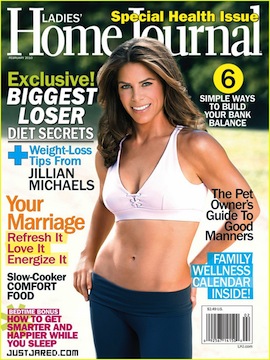Could Wine Publishing Follow Ladies into a New World?
 “We are marrying the authority of print to the authenticity of experience.”
“We are marrying the authority of print to the authenticity of experience.”
This is how Diane Malloy, the new publisher of the venerable Ladies Home Journal, explained to the New York Times that publication's transformation to a magazine that will be primarily created with user/reader generated content.
It got me wondering a few things. First, would wine lovers support a magazine primarily made up of reader/user-generated content and, second, when marrying the "authority of print" with the "authenticity of experience, is the authority of print diminished?
First, I don't think there is any doubt that a significant amount of "authority" does accompany print magazines. Why that authority exists and if it is a hold over from the days when information was primarily distributed via print is another question.
In the wine industry, it is simply a fact that those information vehicles that originally began as print publications still possess the greatest amount of authority among wine lover and the trade. The Wine Spectator, Wine Enthusiast Magazine, Wine & Spirits Magazine, The Wine Advocate, Connoisseurs Guide to California Wines, Decanter, and others remain the wine information sources that still possess the most authority. Measuring that authority is surely done in large part by measuring the number of folks that read and subscribe to these publications.
But it is interesting to imagine if a new, well-financed magazine or if one of the established magazines could gain or retain significant authority were they to give their pages over primarily to the readers. The wine publishing industry has long traded on the perception and reality of expertise for the simple reason that wine has always been viewed as subject matter that required it.
Malloy at LHJ told the times that the switch at the magazine resulted from what readers wanted:
"Ms. Malloy said the approach came about after research showed the magazine’s readers wanted more of their voices reflected in the content and to feel as if they belonged to a community. 'It is reflective of real life,' Ms. Malloy said. 'When you have a health issue or a sticky situation, you are likely to reach out to your community, your sister, your friend, your neighbor, your church.' ”
Who am I likely to reach out to if I am considering buying futures of Bordeaux? Who am I likely to reach out to if I'm wanting information on the state of the wine auction market? Who am I likely to reach out to if I want an overview of the development of Pinot Noir production in the far west Sonoma Coast region?
In these and other cases I want professional, well-informed information from someone who makes it their job to seek out such detail. However, there are cirucmstances where reader-generated informatino at a wine publication might be just fine. Here I'm thinking that wine reviews generated by a Cellar-Tracker type community my serve my purposes to appreciate new wines. Reviews of wine events and books too would be something a community or reader could easily provide too.
What readers, however, will never be able to replace are experienced, intuitive editors that understand the audience. Of course, the folks at the Ladies Home Journal are not giving up on editors.
I'm tempted to suggest that what is happening at the LHJ is a combination of cost-cutting and an embrace of a social media mindset, rather than a real embrace of what the reader wants and needs form a general woman's magazine. I'm also tempted to suggest that there is a dumbing down going on. Tempted, but not committed, because it would be ugly and pretentious of me to suggest that letting readers take over the pages of a magazine will produce less authoritative content.
But this brings us back to the notion that one can meld the "authority of print" and the "authenticity of experience" without losing much of the former. I don't think you can. The "Authority of Print" isn't really derived from the fact that the words are placed on pulp. The "Authority of Print", which does exist, derives from the authority of those putting the words on the pulp.

“I’m tempted to suggest that what is happening at the LHJ is a combination of cost-cutting and an embrace of a social media mindset, rather than a real embrace of what the reader wants and needs form a general woman’s magazine. I’m also tempted to suggest that there is a dumbing down going on.”
OK, so you don’t want to say it outright and seem presumptuous–I do not suffer from your hesitance…
Bingo!
One of the best, liveliest, and most knowledgeable wine sites were the Squires/Parker message boards a few years back. All user generated content, much stickier and interesting than the regular content.
I will miss “Can This Marriage be Saved” in the LHJ. So much drama over the years: “He started bringing home wine picked at 26 Brix, I almost couldn’t recognize him at that point. Is he cheating on me with spoofolated Napa Cab?”
tom —
although LHJ goes the “dear abby” route i don’t think wine publishing will follow — our world is so large and growing larger — we’re looking for experienced journalists with experienced editors to help us find interesting stories. that will always have readership and sales clout.
hharvey
As you mentioned, it really depends on the subject matter and to what degree the content is user-generated. To a small degree, newspapers have combined authority of print with authenticity of experience (op-eds) for decades. Review sites for electronics, books, movies, etc. (although not “print”) have also long included both user reviews and expert reviews. That being said, I think most consumers are much more willing to pay for expert, informed opinion than for the opinion (which may or may not be expert or informed) of unknown individuals.